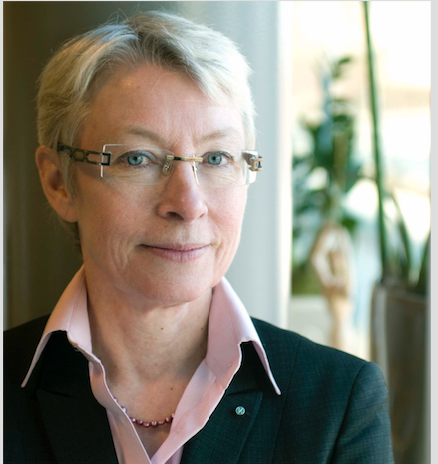Dr. Anna Nilsson-Ehle

Dr. Anna Nilsson-Ehle is Director for SAFER – Vehicle and Traffic Safety Centre at Chalmers University of Technology. She holds this position since 2006 when SAFER was established. SAFER is a collaborative research centre for vehicle and traffic safety, with some 30 partners from Academy, Industry and Society. She started her career as a product development engineer in the steel industry. 1979 she moved to Volvo Safety Centre to work with the pioneering development of car safety requirements based on accident investigations. She continued in different positions within Volvo for 20 years. She has been in managerial positions since 1983 and has held positions such as head of the 240-company, vice president of Volvo, vice president of Volvo Cars responsible for Complete Vehicle and later for Change Management. In 1999 she was appointed Managing Director of Universeum, the Swedish National Science Discovery Centre that was inaugurated in 2001. In 2005 she moved to a position as senior consultant at the management consultant company, Ohde& Co. Anna Nilsson-Ehle has a Master of Science in Engineering Physics from Chalmers, and is Doctor of Science, h.c. at the Royal Institute of Technology, KTH. She is a member of the Royal Swedish Academy of Engineering Sciences and was awarded the Gustaf Dalén memorial medal in 2013.
Title: Traffic safety – a boundary condition for autonomous driving?
Abstract: The Swedish ”Vision Zero” for traffic safety is a mindset and an ethical statement but also a systemic approach saying that the transport system, with its components, should be designed to cope with hazards and errors that potentially cause life-threatening injuries to people. The technological development has now taken us to a level where connected, automated vehicles are expected to relieve the human driver from the responsibility of being an active component in the system and thus increasing the total safety level towards zero accidents. However, what issues regarding requirements on the different system levels – vehicle, traffic and urban environments, does this actually raise? SAFER, vehicle and traffic safety centre at Chalmers, strives to take a holistic approach and gather the different competences needed to address the different aspects, in the context of a sustainable transport system. My intention with the talk is to discuss the challenges and opportunities with this approach.
Prof. Hans Hansson

Prof. Hans Hansson is professor in Real-Time Systems at Mälardalen University since 1997. He is director of Mälardalen Real-Time Research Centre and the PROGRESS national strategic research centre, Scientific Leader of SICS Swedish ICT Västerås AB and the EU/ARTEMIS project SafeCer. He received an MSc (Engineering Physics), a Licentiate degree (Computer Systems), a BA (Business Administration), and a Doctor of Technology degree (Computer Systems) from Uppsala University (UU), Sweden, in 1981, 1984, 1984 and 1992. Prof. Hansson’s previous appointments include being director of the national research programme ARTES, visiting prof. and dept. chair at the Dept. of Computer Systems, Uppsala University, and researcher and scientific advisor at the Swedish Institute of Computer Science (SICS) in Stockholm.
Title: Challenges in functional safety for future cooperative and autonomous systems
Abstract: Requirements on functional safety is threatening to become a show-stopper for the current rapid and exciting development towards flexible and AI-based autonomy such as autonomous driving and platooning in the vehicular domain, and more generally the broader introduction of robotics and cooperative functions.
This presentation will give an overview of challenges and possible solutions, with emphasis and issues from some of the projects that I am or have been involved in. The perspective is largely from the pragmatic side, i.e. although delivered by an academic, more focusing on some of the issues a company that is planning to deploy a safety critical autonomous product is facing, than on presenting specific academically proven solutions.
Panel
Title: Do the autonomous systems jeopardize the safety?
Abstract: Today there is a strong development towards autonomous vehicular systems (autonomous cars, trucks, etc.). The functionality of such systems is already on its way of a full implementation, but the main challenges related to safety still remain. The question is how to ensure, or to build in safety and at the same time flexibility and adaptability in such systems together with use of new technologies such as machine learning and utilization of “big data”.
The panel has two experts in machine learning and big-data, and two experts in safety who will discuss flexibility and adaptability vs. safety requirements.
Panelists
- Devdatt Dubhashi, professor at Chalmers University of Technology
- Estevam R. Hruschka Jr., professor at Carnegie Mellon University, USA, and Federal University of Sao Carlos (UFSCar), Brazil
- Anna Nilsson-Ehle, Director of SAFER research center
- Hans Hansson, professor in real-time system at Mälardalen University